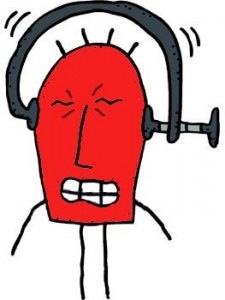 Have you ever followed an argument with a friend – or maybe with your Mom – with a trip to the bakery or the closest candy store?
Have you ever followed an argument with a friend – or maybe with your Mom – with a trip to the bakery or the closest candy store?
You could already be stuffed to the gills. But, all you can think about is getting that cookie, or candy bar, or bag of pretzels and chowing down – even though you’re not hungry and may or may not actually enjoy what you’re eating.
There’s Real Hunger And There’s Head Hunger
Real hunger or physiological hunger is your body’s way of telling you that it’s time to eat food for nourishment. It’s when you have that empty, rumbling feeling in your stomach, a headache, maybe some lightheadedness. It usually occurs two to four hours after your last meal.
Head hunger or psychological hunger doesn’t have physical symptoms and can happen at any time. It can be triggered by emotional situations, habits — like watching TV, working on the computer or driving in the car — or by food cravings or as a form of procrastination. Whatever triggers your head hunger can make you think you’re hungry when you’re really not.
Emotions: Common Triggers For Eating
Emotions are common triggers for eating. Head hunger is emotional eating usually in response to gremlins like stress, sadness, loneliness, anger, fear, or boredom.
Head hunger also serves as a distraction – the eating it provokes can be a way to distract yourself from difficult situations, projects, and encounters.
The thing is, these feelings and situations are a part of life and eating won’t make them go away. Eating in response to head hunger often keeps you from figuring out what’s causing the feeling in the first place.
“I want chocolate” might really mean “I need comfort” or “I worked my tail off and I really need to be recognized for it.” Those trips back and forth to the fridge or the vending machine might be the ultimate form of procrastination – is there a project that needs to get done that you’re struggling with?
What To Do
Wouldn’t it be great if it was as simple as figuring out what’s causing your head hunger and dealing with it. The fact is, that’s the answer. Eating can’t really satisfy your emotional needs, and left unmet, those needs will trigger your head hunger over and over. So, you overeat, you mentally beat yourself up, you feel awful, and the whole process is triggered once again.
To break the pattern, first stop beating yourself up when you eat in response to head hunger — as opposed to eating because you’re starving and your stomach is growling like crazy. Devise a plan to figure out what caused you to eat in the first place. Try keeping a written record of what happened and how you felt before your head hunger took charge. Looking back at a series of entries might give you a clue. Once you get a handle on your triggers, come up with a plan to deal with them and make a “go-to” list of ways to reward, calm, comfort, and/or distract yourself without eating.

Leave a Reply